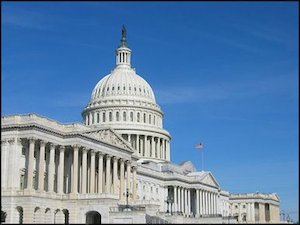
Transportation funding: summer’s biggest blockbuster

Suddenly, transportation funding is the topic de jour.
Last night, the House debated the measure that will set transportation spending levels for the coming fiscal year, the Transportation, Housing and Urban Development bill. Among other controversial provisions, the bill would cut the popular TIGER grant program from $600 million today to $100 million. (You can read our full summary of the bill here.)
The TIGER cuts drew opposing statements from 13 Democrats and from the Obama Administration, which has called for an increase of TIGER funds to $1.25 billion. The Administration Monday declared its opposition to the THUD measure, citing in part a TIGER funding cut that “would reduce an already highly competitive grant program and its ability to support innovative projects across the United States.”
Meanwhile, both the House and the Senate are scrambling to find new ways to keep the highway trust fund solvent. With tax increases off the table in an election year as an expected shut-off of funding for new projects looms, both houses appear to be searching for short-term measures to plug the gap between lagging gas tax receipts and current spending levels.
As you may have heard, House Republicans have proposed to find the money by eliminating Saturday postal service and applying the savings (potentially up to $2 billion a year) to help fund the Highway Trust Fund. Interestingly, Postmaster General Patrick Donahoe, who has himself pushed to cut Saturday service, told interviewed by the Washington Post earlier this week that he was delighted by the idea.
However, this plan is not widely supported by either party. More than three-dozen House Republicans have signed a letter stating their opposition to five-day delivery service, and House Democrats do not see this as a viable fix for the funding gap.
In the Senate, Senator Harry Reid (D-NV) and Senator Rand Paul (R-KY) have created a bipartisan plan that includes a one-time tax “holiday” for multinational corporations to bring profits home from overseas with a lucrative tax deduction. Such a move would yield a windfall of $20 billion to $30 billion over the next two years, they estimate.
While that would be enough to cover the projected trust-fund shortfall for a year or two, it would not solve the longterm problem. It also has drawn opposition from other key leaders who fear a longterm hit to the treasury if the profit repatriation is not tied to comprehensive corporate tax reform – changes that are far too complex to work through before the looming deadline.
Stay tuned. It’s going to an interesting summer.



